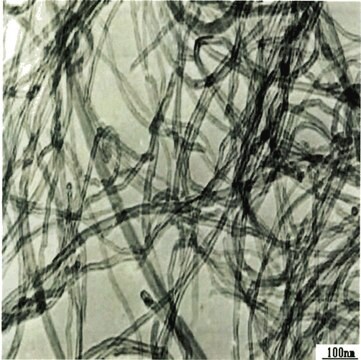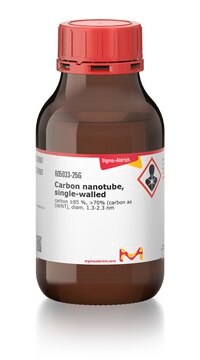412988
Carbon nanotube, multi-walled
as-produced cathode deposit, >7.5% MWCNT basis, O.D. × L 7-15 nm × 0.5-10 μm, avg. no. of layers, 5 ‑ 20
Synonym(s):
MWCNT, MWNT, Multiwall carbon nanotube
About This Item
Recommended Products
Quality Level
Assay
>7.5% MWCNT basis
form
powder
feature
avg. no. of layers 5 ‑ 20
composition
carbon content, >99% TGA
O.D. × L
7-15 nm × 0.5-10 μm
mp
3652-3697 °C (lit.)
density
~2.1 g/mL at 25 °C (lit.)
SMILES string
[C]
InChI
1S/C
Looking for similar products? Visit Product Comparison Guide
General description
Application
Physical form
Preparation Note
Other Notes
Storage Class Code
11 - Combustible Solids
WGK
WGK 3
Flash Point(F)
Not applicable
Flash Point(C)
Not applicable
Personal Protective Equipment
Choose from one of the most recent versions:
Already Own This Product?
Find documentation for the products that you have recently purchased in the Document Library.
Customers Also Viewed
Articles
Carbon nanotubes (CNTs) have received much attention since their discovery in 1991 by Sumio lijima1 due to their excellent mechanical, electrical, and optical properties.
A nanocomposite is typically defined as a mixture between a host material (e.g., polymer matrix) and nanofillers with at least one dimension of less than 100 nm.
Single-walled carbon nanotubes (SWCNTs) are promising materials for use in the active channel of field-effect transistors (FETs), photoabsorbing layers of solar cells and photodetectors because of their ultrafast charge transport mobility.
Building and Engineering Micro/Nano Architectures of Single-Walled Carbon Nanotubes for Electronic Applications
Our team of scientists has experience in all areas of research including Life Science, Material Science, Chemical Synthesis, Chromatography, Analytical and many others.
Contact Technical Service





